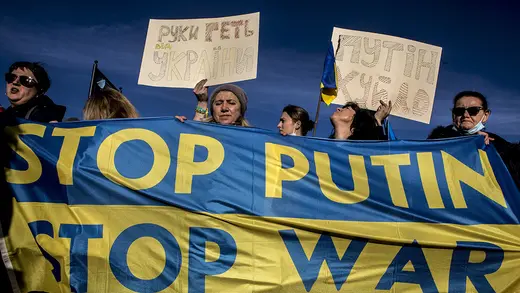In Brief
Why Putin’s War With Ukraine Is a Miscalculation
Putin’s invasion of Ukraine is a geopolitical earthquake that will cause repercussions far beyond Europe. But the Russian president might be planting the seeds for the demise of his regime by overreaching.
How significant is Russia’s attack on Ukraine?
The Russian invasion of Ukraine is tragic and shocking. It constitutes an unprovoked attack against a sovereign nation. In revealing the aggressive and expansive ambitions of President Vladimir Putin, this invasion will likely bring about the return of a Europe afflicted by militarized division.
Putin launched the invasion despite impressive transatlantic solidarity and his full awareness that the West would respond by imposing severe economic sanctions and substantially reinforcing the eastern flank of the North Atlantic Treaty Organization (NATO). Now that he has begun the attack, he is likely to proceed with an effort to topple Volodymyr Zelensky’s government and install a puppet regime in Kyiv under the thumb of Moscow.
Do the threats go beyond Ukraine?
More on:
The invasion will have geopolitical effects well beyond Ukraine. Depending upon how far into western Ukraine Russian forces go, a sizable number of Ukrainians could try to flee the country across its western border. NATO and the European Union (EU) should prepare accordingly.
Putin has of late talked about not just pulling Ukraine back into the Russian fold, but also getting NATO to withdraw forces from its new member countries in Central Europe (thereby undoing the European security architecture built since the collapse of the Soviet Union in 1991). His readiness to invade Ukraine indicates a recklessness that could manifest itself in military action elsewhere. He could even test NATO by threatening a member state. Four NATO members—Hungary, Poland, Romania, and Slovakia—border Ukraine; they could face new vulnerabilities. Putin also might flex Russia’s muscles in the Baltic region. NATO members therefore need to take prudent and expeditious steps to reinforce the alliance’s eastern flank by dispatching more air, land, and naval assets to the region. They should also prepare the NATO Response Force to react quickly to Russian threats.
How noteworthy is China’s muted response?
How China navigates this crisis will also shape the geopolitical effects of the Russian invasion of Ukraine. China did not recognize Russia’s annexation of Crimea and it has responded ambiguously to this attack. However, Beijing and Moscow have built a tight partnership of late that encompasses economic, political, and strategic cooperation. Russia’s commercial links to China will help the Russian economy weather international sanctions.
It is conceivable that the Russian invasion will produce Cold War 2.0, not just with Russia but with a China-Russia bloc. It is also conceivable, although less so, that Beijing will distance itself from Moscow to avert that outcome and dampen the economic and geopolitical impact of Russia’s military adventurism. China’s rise, after all, has rested on global economic interdependence and geopolitical stability in Eurasia; Beijing might view Putin’s latest moves as too provocative and disruptive for its taste. The United States and its allies should take advantage of Russian recklessness to try to put some distance between China and Russia.
What can Ukraine do?
The most potent obstacle to Putin’s neo-imperial adventurism is the Ukrainian people. The Maidan revolution and Russia’s subsequent aggression against Ukraine in 2014 helped nurture a strong sense of solidarity among Ukrainians and deepened their determination to build a successful democracy integrated into Europe. Putin’s invasion will only further unify the Ukrainian people and intensify their determination to permanently leave Russia’s coercive sphere of influence. Accordingly, it is difficult to discern Putin’s endgame. Does he really believe that he can install a regime that enjoys legitimacy and the support of Ukrainian citizens? Is he prepared to occupy a country of forty-four million people and use coercion and intimidation to suppress grassroots resistance?
More on:
Ukraine will not be able to defeat the Russian military. But there is a good chance that Ukrainians will ultimately be able to defeat Russia’s efforts to rule over their country. Nations around the world should stand by the Ukrainian people and provide the political and material support, including arms, that they need to resist Russian aggression.
Putin might be reasserting control over Ukraine in a physical sense, but not in a political and moral sense. When Russians ultimately ask, “Who lost Ukraine?,” the answer will be Putin. By invading Ukraine, Putin might well be overreaching and unwittingly sowing the seeds of the demise of his regime.
What’s an effective containment strategy?
Overall, the West’s best containment strategy is to maintain solidarity. Putin likely acted when he did because he thought he could exploit divisions among Western democracies. The United States is coping with polarization, Britain has left the EU, Germany has a new and untested chancellor, and illiberal populism has reared its head on both sides of the Atlantic—Putin likely thought he could take advantage of these conditions to crack the West.
But he miscalculated. Transatlantic partners have stood shoulder to shoulder in recent months, and that unity will only grow stronger now that Russia’s invasion of Ukraine has begun. Like-minded countries around the world, democracies and nondemocracies both, should link arms in the face of Russian aggression. The stakes go well beyond the borders of Ukraine.
 Online Store
Online Store

